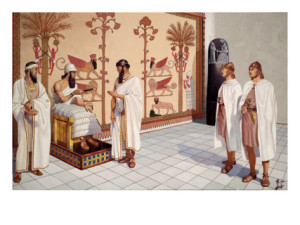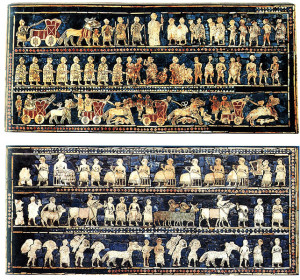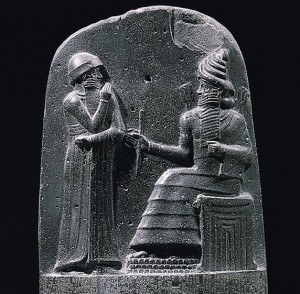 As a history buff, particularly ancient history, I’ve always been especially interested in the empires and cultures that started it all. I don’t mean to downplay the important influence of Greece, Persia, the independent New World centers of Norte Chico and the Olmec, or any of the many other civilizations. Each of them made important cultural, spiritual, and scientific contributions to our modern world, but the so-named Cradles of Civilization in Egypt, India, China, and Mesopotamia, stand a little apart. The combination of reliable water supplies, rich soils, and the need for irrigation to support rapidly growing populations begat (never thought I’d use that word in a blog) the need for organization and enabled specialization. The development of these two aspects in their societies led directly to the creation of civilizations. Organization initiated the first governments and specialization encouraged the rise of science and culture.
As a history buff, particularly ancient history, I’ve always been especially interested in the empires and cultures that started it all. I don’t mean to downplay the important influence of Greece, Persia, the independent New World centers of Norte Chico and the Olmec, or any of the many other civilizations. Each of them made important cultural, spiritual, and scientific contributions to our modern world, but the so-named Cradles of Civilization in Egypt, India, China, and Mesopotamia, stand a little apart. The combination of reliable water supplies, rich soils, and the need for irrigation to support rapidly growing populations begat (never thought I’d use that word in a blog) the need for organization and enabled specialization. The development of these two aspects in their societies led directly to the creation of civilizations. Organization initiated the first governments and specialization encouraged the rise of science and culture.
 Okay, there’s a lot more to it than that, but my point is that the people in the Cradles met and solved these challenges first. Their solutions formed the stepping stones that later cultures followed to build their civilizations and ultimately our own. Most of our concepts in math, science, astronomy, philosophy, and many other aspects of modern life trace their roots to the solutions in the Cradles of Civilization. Examples include the creation of a large bureaucracy in China, writing in Mesopotamia, the idea of zero from India, and formal medical training in Egypt. There are many more. Ever wonder why there are 360 degrees in a circle? Or why hours and minutes are divided into 60 parts? Credit (or blame?) the Mesopotamians.
Okay, there’s a lot more to it than that, but my point is that the people in the Cradles met and solved these challenges first. Their solutions formed the stepping stones that later cultures followed to build their civilizations and ultimately our own. Most of our concepts in math, science, astronomy, philosophy, and many other aspects of modern life trace their roots to the solutions in the Cradles of Civilization. Examples include the creation of a large bureaucracy in China, writing in Mesopotamia, the idea of zero from India, and formal medical training in Egypt. There are many more. Ever wonder why there are 360 degrees in a circle? Or why hours and minutes are divided into 60 parts? Credit (or blame?) the Mesopotamians.
 As cool as I find all of that, I’m clearly in the minority. For many people, especially kids, history is little more than the rote memorization of names, dates, and lists, which not surprisingly many find boring. History is also more than simple appreciation for the past achievements that helped build our society. History offers an opportunity to find inspiration to spur us on to greater discoveries. Yeah, I know, pretty grandiose stuff from an ex-engineer who writes YA/tween fantasy novels, but I believe it. One of my goals in writing the Misaligned series is to introduce my readers to the fun side of history. In the first book, I tackle Mesopotamia, with segments on math, food, and Hammurabi’s code.
As cool as I find all of that, I’m clearly in the minority. For many people, especially kids, history is little more than the rote memorization of names, dates, and lists, which not surprisingly many find boring. History is also more than simple appreciation for the past achievements that helped build our society. History offers an opportunity to find inspiration to spur us on to greater discoveries. Yeah, I know, pretty grandiose stuff from an ex-engineer who writes YA/tween fantasy novels, but I believe it. One of my goals in writing the Misaligned series is to introduce my readers to the fun side of history. In the first book, I tackle Mesopotamia, with segments on math, food, and Hammurabi’s code.
An excerpt from Misaligned: The Celtic Connection
She was about to give up on him, when Penny saw Duncan outside the classroom door. She raised her eyebrows at the sight and stifled a smile. She turned to the class and told them they had one minute left.
She walked to the door and opened it just enough to get a good look at Duncan. She suppressed a giggle.
He was in a long tight-fitting green linen dress, with a rounded neckline that plunged several inches down his chest. It had short sleeves and fringes along the bottom just above his ankles. He wore leather sandals and a broad leather belt high on his waist. He had wide bronze colored bracelets on both arms and a gaudy ring on his left index finger. He also carried a rolled parchment.
Even more striking was his wig of long tightly curled black hair held back from his face by a leather band. He wore a beard of similar hair that reached to his exposed chest. To complete the ensemble, he wore dark ‘eye shadow’ under his eyes. Duncan drew the line at using real eye shadow and instead wore the black no-glare eye grease used by athletes.
“Are you ready?”
“I feel like I’m wearing Aunt Betsy’s drapes! You should’ve seen the look I got from Mr. Parsons! Gym class is going to be rough tomorrow.”
“Don’t worry about it. I had doubts about Mary and Grace’s idea to cross-dress for Halloween, but if they hadn’t insisted, we couldn’t have pulled this off.”
“Count me with the doubters,” replied Duncan.
“Stop it, you look great,” she said. Duncan rolled his eyes. “Seriously,” Penny continued, “It’s time for Hammurabi to make his grand entrance and serve some Babylonian justice!”
With that she opened the door and quoting directly from the code proclaimed: “Hammurabi is a ruler, who is as a father to his subjects, who holds the words of Marduk in reverence, who has achieved conquest for Marduk over the north and south, who rejoices the heart of Marduk, his lord, who has bestowed benefits for ever and ever on his subjects, and has established order in the land.”
On cue, Duncan walked through the door and quoting from the prologue proclaimed in his most serious voice, “Anu and Bel called by name me, Hammurabi, the exalted prince, who feared God, to bring about the rule of righteousness in the land, to destroy the wicked and the evil-doers; so that the strong should not harm the weak; so that I should rule over the black-headed people like Shamash, and enlighten the land, to further the well-being of mankind.”
The class greeted him with silence. Most weren’t sure what to make of his strange costume; several of the boys looked around trying to decide if it was okay to laugh. Penny and Duncan knew they had to take control of the situation before laughter broke out because once it started their presentation would be ruined.
They asked Mark Chapman to help by taking the role of the first petitioner in their presentation. All he knew was that Duncan would ask for claims from the class and he would then read his card.
Duncan called out to the class, “As your leader I have come to hear your complaints and dispense justice. Are there any claims?”
Nothing but silence and Penny thought she made a mistake in passing out the cards. She looked at Mark, who was staring at Duncan with a blank look on his face, and loudly cleared her throat.
Mark stood up. “My name is Mark Chapman and I swear by God that I contracted with Jack Hoskins to build a house and the house collapsed because of his poor workmanship, destroying all of my belongings.”
That broke the ice, and the rest of the team read the lines from their cards. Eddie Macias was another unsatisfied customer of Jack’s, whose house collapsed and killed his son.
Duncan made a show of unrolling the scroll he was carrying and read from it, quoting the code. “If a builder builds a house for someone, and does not construct it properly, and the house, which he built, falls in and kills its owner, then that builder shall be put to death. If it kills the son of the owner, the son of that builder shall be put to death. If it ruins goods, he shall make compensation for all that has been ruined, and inasmuch as he did not construct properly this house which he built and it fell, he shall re-erect the house from his own means.”
Duncan then continued, “In accordance with my code, I proclaim that Jack Hoskins must pay Mark Chapman for the goods he has lost and make repairs to his house. I also decree that since the son of Eddie Macias died in a house improperly built by Jack Hoskins, not only must Jack rebuild Eddie’s house at his own expense, but Jack’s son shall be put to death.”
As always thanks for reading.
Armen
More information
Please visit my website for more information about the Misaligned series.
Links for additional information
Hammurabi’s Code in English
Notes on early Indian & Chinese civilizations
Interesting facts about Ancient Egypt


A very interesting and enjoyable post. This ties in with a lot of things I posted myself about ancient Sumerian culture, good old Marduk! Like you, I find ancient history absolutely fascinating and love combining that with ancient mythology and my own fantasy writing. Really great to see someone else talking about Sumer, Babylonia & especially Hammurabi, many of his laws are still in such common speech usage today – An eye for an eye! 😀 http://sophieetallis.wordpress.com/2013/05/04/the-writings-on-the-wall-er-tablet/
Thanks so much for reading and sharing your post on writing.
Reblogged this on Library of Erana and commented:
Everyone has heard of the Ancient Greeks and Romans but as this post suggests there were many other civilisations fundamental to human achievement and advancement – the domestication of rich in the Yellow River Valley, medicine from Egypt, and so the list goes on.